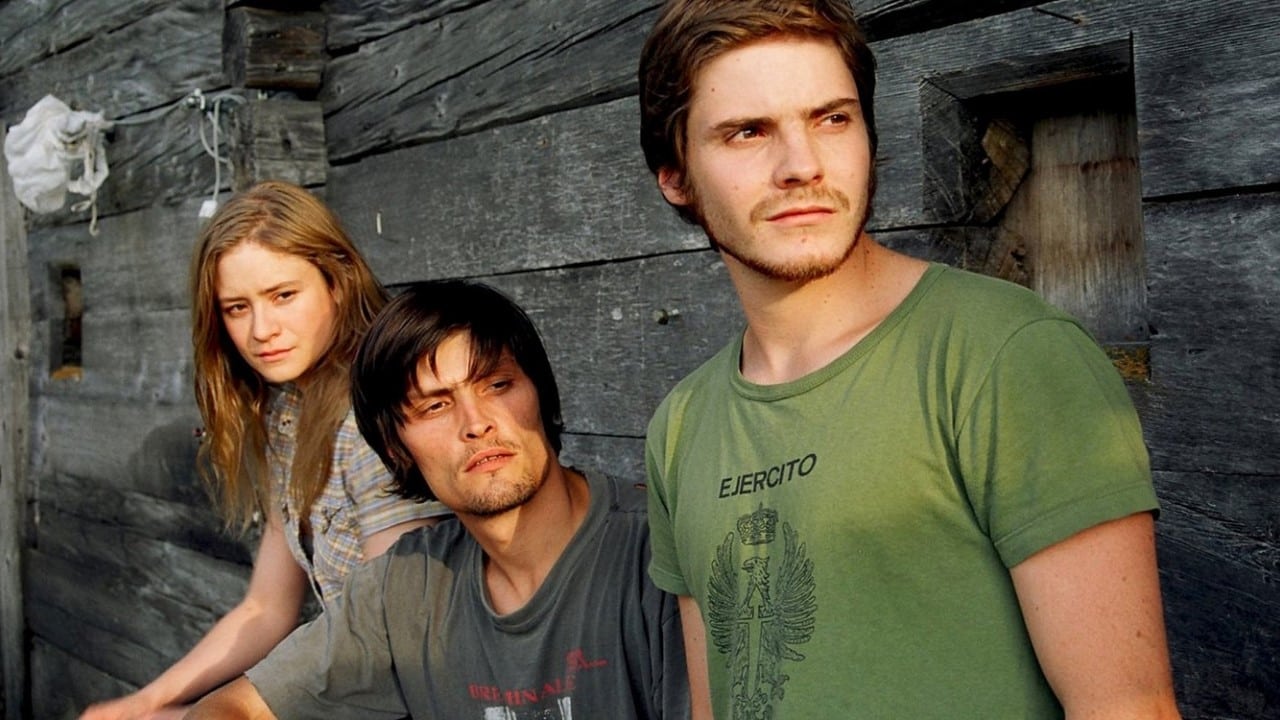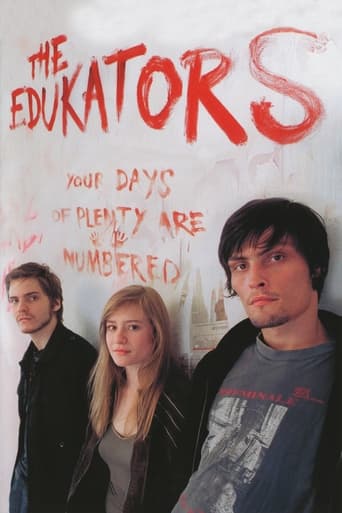

The Edukators is named after the Self Designated name of a group, by which three characters the film follows, created. Jan and Peter, whom are best friends, are the original team that make up The Edukators. They are renown for breaking into large villas in their town and rearranging the furniture to instill a fear into the wealthy homeowners that they are not safe. Instead of burglary as the end goal of their breaking and entering, they want to send a message to the upper class that they have more money then they need. Jules, Peter's girlfriend is a victim of an upperclassman named Hardenburg, who sued her for totaling his Mercedes a few years before the film. Jule had no insurance, and therefore was in over her head with debt. At the start of the film, Jule was not informed of the team her boyfriend and his friend had been a part of. A love drama begins around Jule and Jan, while Peter goes away to Barcelona. Jan tells Jule what him and Peter actually do at night while she's sleeping. Jule begins to fall in love with the idea of going against the upper class while at the same time falling for Jan. One evening, while Peter is still away, Jule spontaneously decides to break into Hardenburg's home with Jan and commit the usual acts of the group. During their act, Jule mistakenly leaves her cell phone behind. When they both go back the next night, Hardenburg comes home to catch the two red handed. Hardenburg also recognized Jule, so caught in this predicament, they decide to call Peter to come to the home and help kidnap him. The second half of the story than encircles the group in a vacation cabin in rural Germany, which Jule's uncle owns and seldom stays. While inhabiting the cabin and taking care of their prisoner, the four converse about the purpose of their group and Hardenburg's background. While this is happening the love triangle begins to unfold, and feelings get hurt. Surprisingly, the group finds out that Hardenburg was once part of a similar team in the '60s called the Socialist German Student Union. In my opinion, the second half of the movie is dry and very slow. It seems to turn from a political led action flick to a love story where friendship is tested. I agree with one of the reviews here that the movie could have been much bolder with the ending but instead chose to be didactic. I hope you find this useful and would love to talk to anyone who wants to discuss the movie more!
... View MoreAs this film opens we see a family returning to their large and obviously expensive house; something is wrong though; all their possessions have been rearranged; nothing has been stolen though and a note has been left which states 'the days of plenty are over'; clearly whoever broke wanted to make a statement. We soon learn that the people who did it were two young radicals named Jan and Peter. Peter's girlfriend Jule knows nothing about these events until she tells Jan how she is almost 100,000 in debt because she crashed into a businessman's Mercedes while uninsured; Jan then tells her what he and Peter get up to. They are not far from where the businessman lives so Jule suggests they go and look at his house; when there is nobody home she suggests he should be the next victim and they do it there and then; rearranging items and even throwing a couch in the pool... Jule thinks it was great fun... until she realises she dropped her phone there! The two of them return but while they are searching Herr Hardenberg, the businessman, returns. Not knowing what to do they call Peter and the three of them kidnap Hardenberg and head to a remote alpine cottage. Here they discuss what they should do with Hardenberg; they also learn that he wasn't always a wealthy capitalist; once he was a radical just like them... but does that mean they can trust him when he says he won't report them to the police?When I started watching this film I wasn't sure what to expect; I knew it involved a kidnapping but had no idea how it would end; shortly after they got to their scenic hideaway I had a very good idea how it would all end... but it didn't! While the politics does seem rather heavy handed at times, we are clearly meant to sympathise with the trio, it doesn't spoil the film and much of the politics of the trio can be put down to their youthful naïveté. As well as looking at the morality of capitalism there is some sexual politics too as Hardenberg talks of his days of free love in the sixties but when he lets on that he knows Jule is involved with Jan it becomes clear that Peter is not happy with what he learns. While I don't speak German I thought the actors did a fine job keeping their characters believable in an extreme situation.
... View MoreThe ending, as I understood it, was not cheerful. The message found on the wall by the police, "Some people never change" is the conclusion. That applied to Herr Hardenburg and to the three Edukators. When Hardenburg had time to consider what to do in the quiet of his rearranged house, he reverted to his establishment, bourgeois self and called the police. He did not change, once he regained his footing in the world that was his before being kidnapped. Similarly, after having realized that what they did (kidnapping Hardenburg) was done not for idealistic reasons but to try to find a way to save themselves from prison, they did not give up their rather dangerous game. They simply moved to a new location from which to continue - or so I understood. As a dramatic work, I found it too blatant in its messages. It is not the work of a mature writer who allows his (or her) readers to realize what his theme is without making it a classroom of "Edukation". The acting was well done, and the drama was suspenseful. There was just no way of concluding such a story that would not have been tragic or unrealistic. The conclusion offered, a message on the wall, was probably the only other alternative.
... View MoreThe Edukators presents itself as a dark comedy aimed at deconstructing contemporary bourgeois society with a satirical wit. At surface value the films tells the story of self- proclaimed revolutionaries who break into German villas to execute their own political agenda. Rather than with Robin Hood tactics of give and take, or rather take to give, the Edukators simply rearrange the possessions found within the houses they enter; their goal is to strip the wealthy of the false sense of security they procure through financial stability. The film is sure to surprise as its hidden layers unfold and suddenly poignant moments arise. The filmmakers aim to invoke in their viewers a political voice and an urgency to take action. Referencing past revolutionaries and utilizing contemporary music as a stimulator, the film speaks on behalf of an archetypal counter-culture while avoiding any sense of melodrama or impracticality. In addition the narrative touches on a variety of universal themes that include but are not limited to self-discovery, love, friendship, betrayal, and morality. The film maintains a subtle level of sentimentality that allows piercing moments of suspense to rise to the surface while social implications strike the viewer in a meaningful but not overbearing way.
... View More